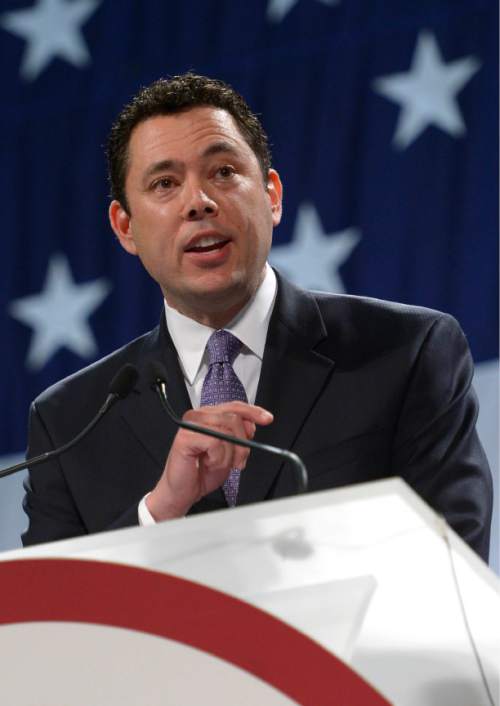This is an archived article that was published on sltrib.com in 2016, and information in the article may be outdated. It is provided only for personal research purposes and may not be reprinted.
For Utah tribes hoping to preserve, access, and manage their lands and sacred sites, the Public Lands Initiative (PLI) offers the best hope for a positive outcome. PLI, which Rep. Rob Bishop and I are introducing in the House and Sen. Mike Lee will run in the Senate, is a legislative solution Utah tribal members helped develop.
The PLI provides broader protections for Native American lands and against a National Park Service (NPS) that has been unfriendly to tribal interests. PLI also utilizes a more inclusive process, offering a better future than an executive action by the President can achieve.
Broader protections • With the stroke of his pen, the president can lock up a contiguous area like the Bears Ears; but the PLI can do more than just protect that one landscape. It can also preserve traditional land uses that have historically been denied to tribes in national monument designations while also promoting needed economic development.
Our proposal calls for 1.1 million acres of National Conservation Area (NCA) — a designation Native Americans have sought. This designation protects the land without locking out traditional tribal land uses the way a wilderness or national monument designation would. The bill also ensures Native American treaty rights are protected.
National Park Service not friendly to tribes • The NPS's history of managing national monuments on sacred lands should serve as a reality check for anyone calling for executive action.
Native Americans got a raw deal with the NPS-managed Canyon De Chelly National Monument and the Wupatki National Monument designations. In Canyon De Chelly (pronounced de-SHAY), the NPS removed more than 300 sets of remains and other cultural artifacts. Attorneys for the Navajo Nation Department of Justice's Natural Resources Unit told reporters that the tribe would never have agreed to the monument designation in 1930 had they known NPS would claim the right to remove remains and cultural objects.
Likewise, Navajo in Arizona's Little Colorado River Valley saw their access to generational homesteads slowly disappear after the Wupatki National Monument (pronounced Woo-Pat-Key) was designated in 1924. After generations of herding sheep in the area, Navajo were told by NPS that "environmental concerns" from sheepherding justified limiting access to lands their families had managed since the 1870s.
By 2014, what was once a thriving community of hundreds of Navajo had become home to a single Navajo elder woman whose home will revert to federal ownership upon her death.
With a legislative solution, we can keep the Bears Ears out of NPS control, protect the Bears Ears and maintain traditional Navajo land use. An NCA designation avoids the risks of denied access and disrespectful activities that would likely come from the National Park Service with the President's executive action.
Inclusive process • Whereas a presidential use of the Antiquities Act requires absolutely no local input — from Native Americans or anyone else — the PLI has incorporated extensive contributions from stakeholders.
Rep. Bishop and I have personally met with tribal groups. Our staff has hosted dozens of meetings and multiple field trips across four states, including a meeting with Navajo Nation President Russell Begaye. No one who wanted to be involved was excluded.
The compromise admittedly doesn't give groups everything they asked for. But the end result is a middle ground between the county's combined 560,000-acre NCA proposal at one end of the spectrum and the environmentalist-driven 2 million-acre request at the other. We believe 1.1 million acres represents a number both sides can live with.
Better opportunities for tribes • From economic development to land management, the PLI offers a brighter future for Utah's tribes.
As active participants in the PLI process, the Navajo Nation, Ute Tribe and Ute Mountain Ute are among the many tribes that gain economic development advantages under PLI. Mineral transfers at McCraken Mesa and land transfers along the San Juan River are among some of the economic opportunities for Native Americans being considered that are not possible under an executive order.
Furthermore, the PLI provides opportunities for tribal engagement in land management. The proposed Bears Ears Management Commission is an advisory council for the NCA that legislatively requires 50 percent of the seats to be held by Native Americans — with a guarantee that at least one will be held by a Utah Navajo.
Ultimately, Utah's Native American tribes get more of what they want and deserve through the legislative process of the Public Lands Initiative than they could ever hope to gain from a unilateral action by President Obama.
Rep. Jason Chaffetz's congressional district includes the Bears Ears.



